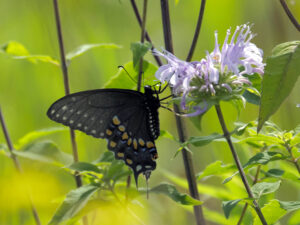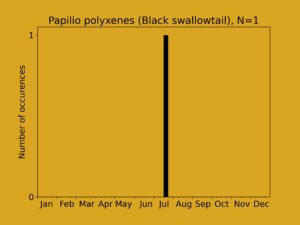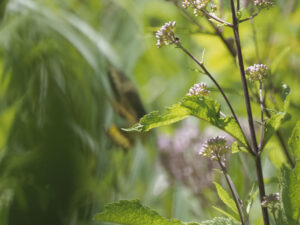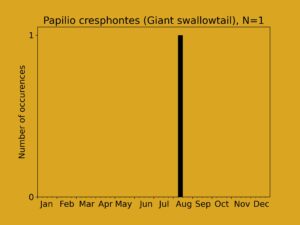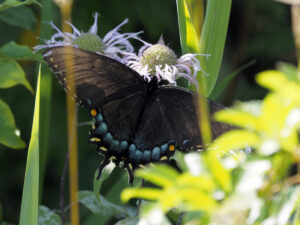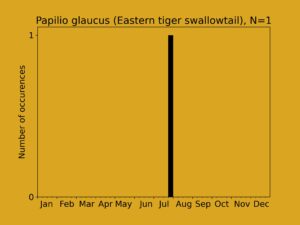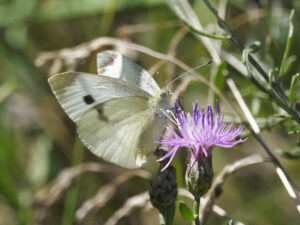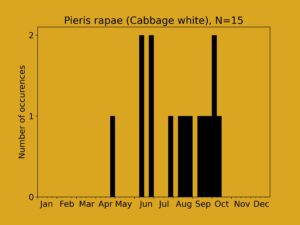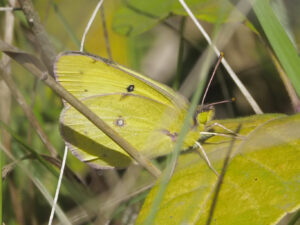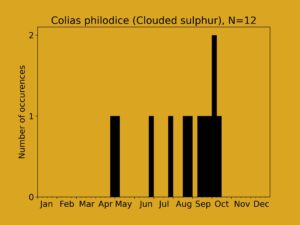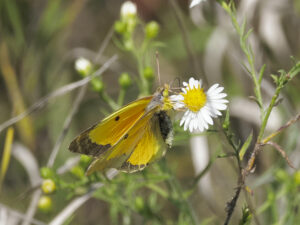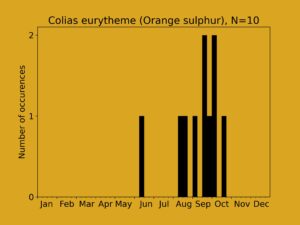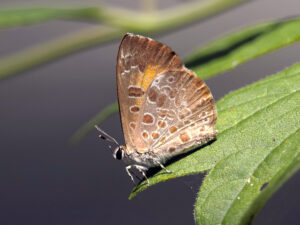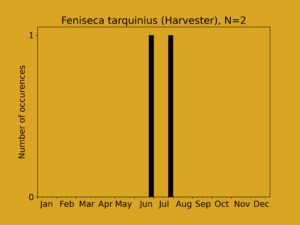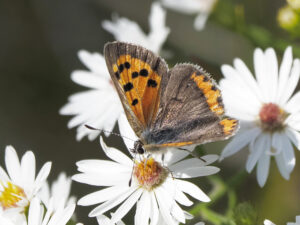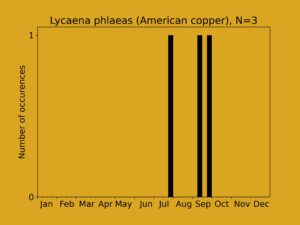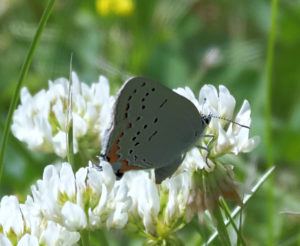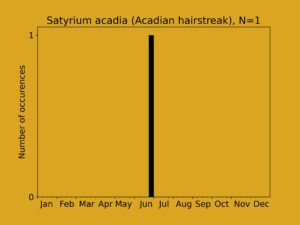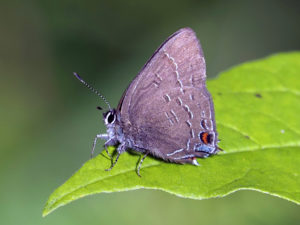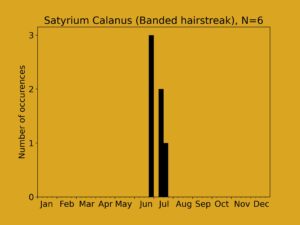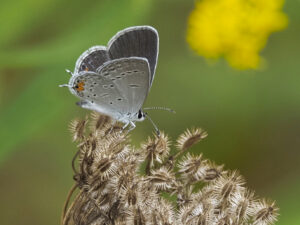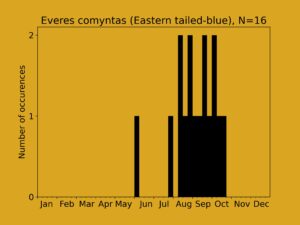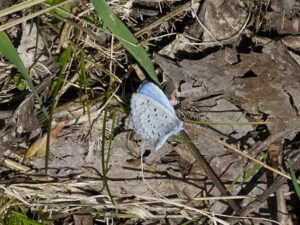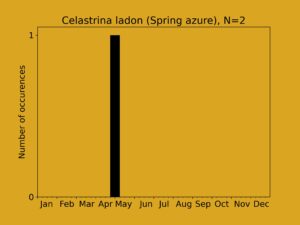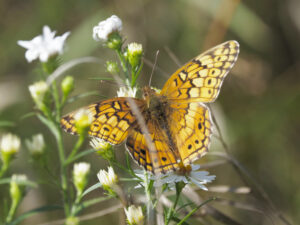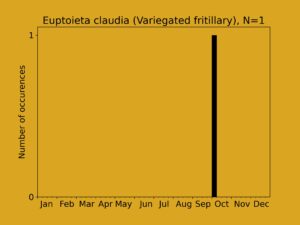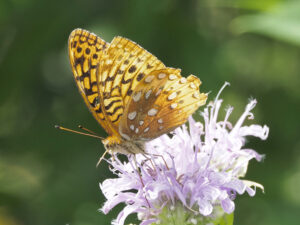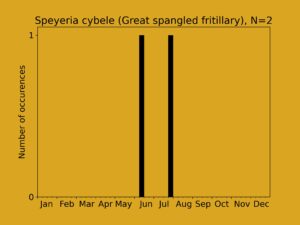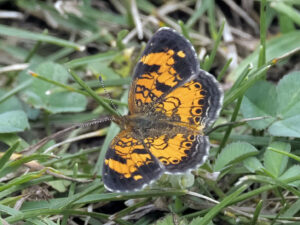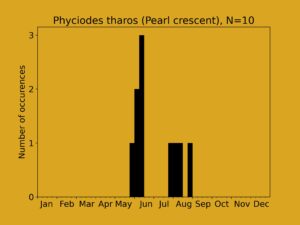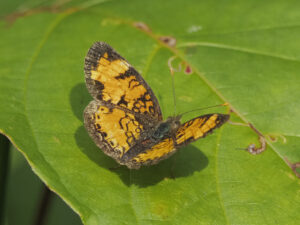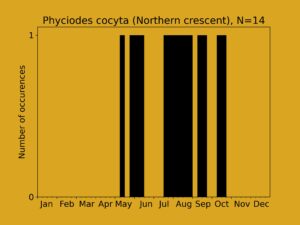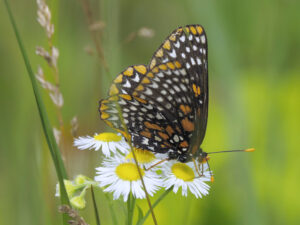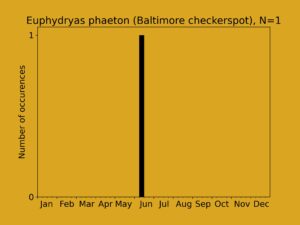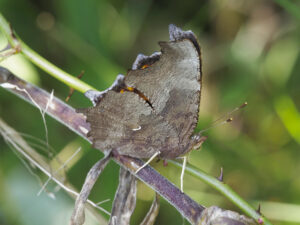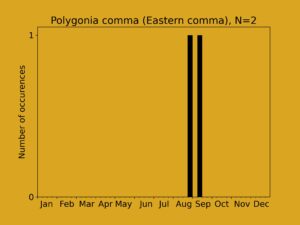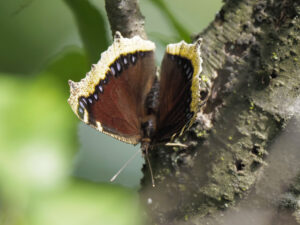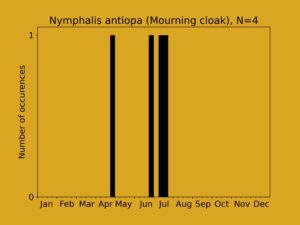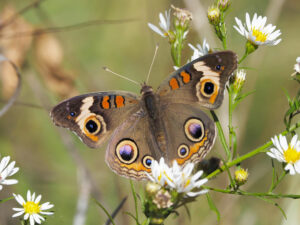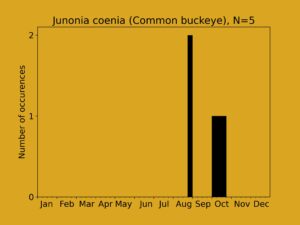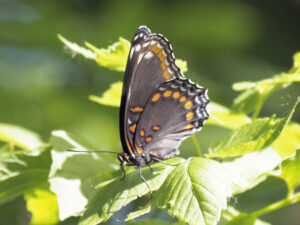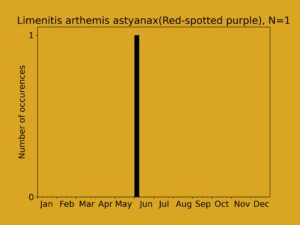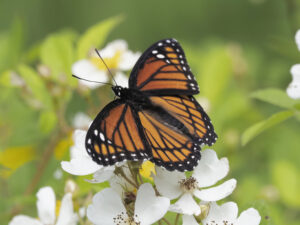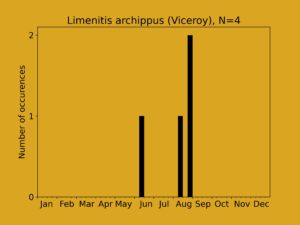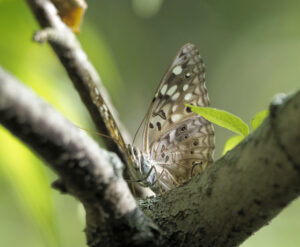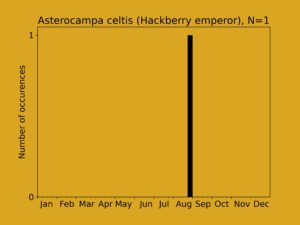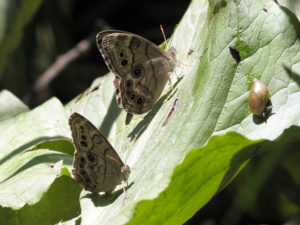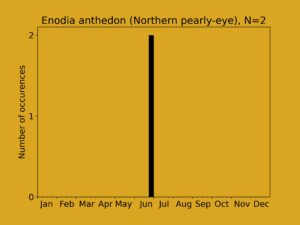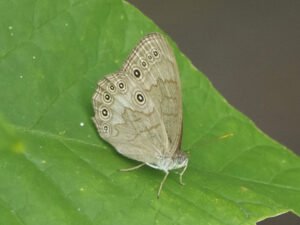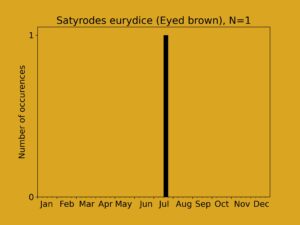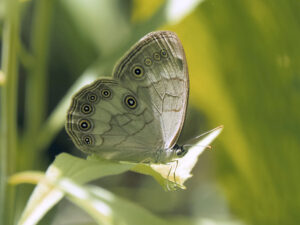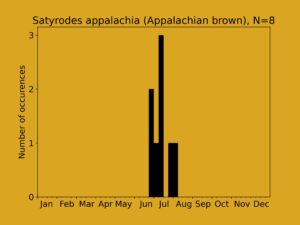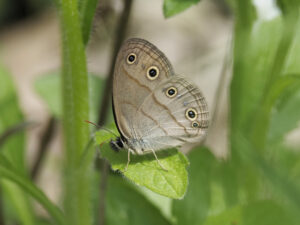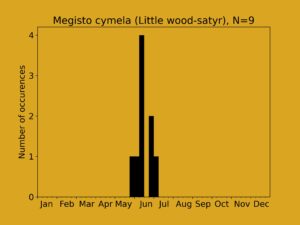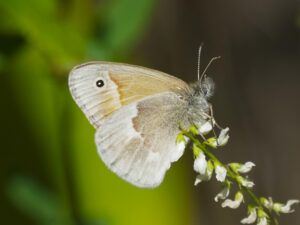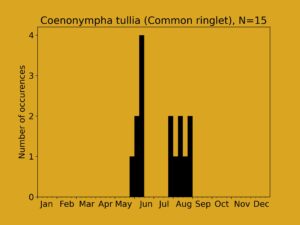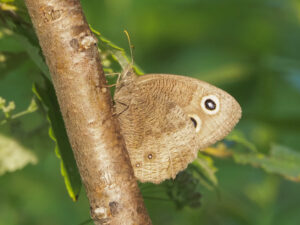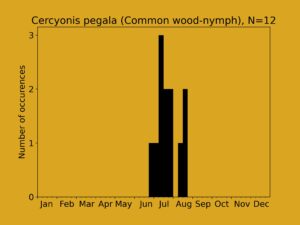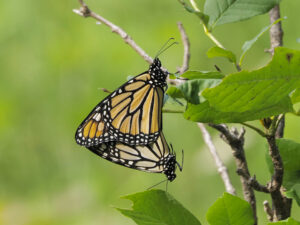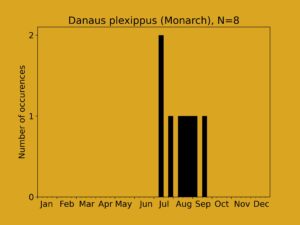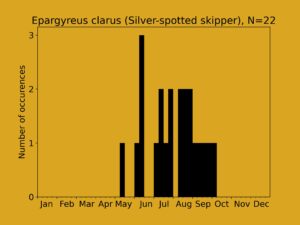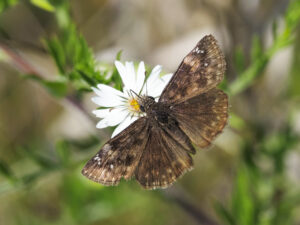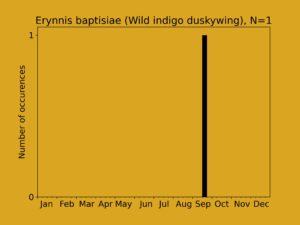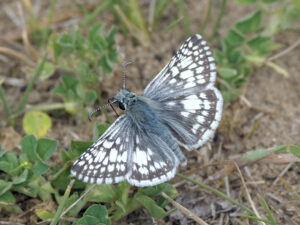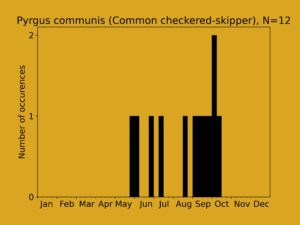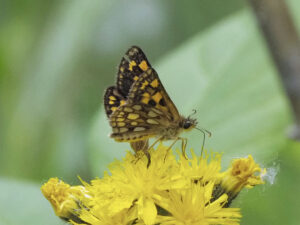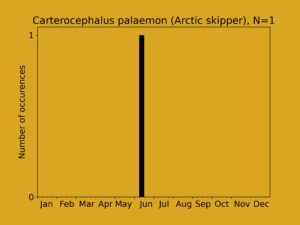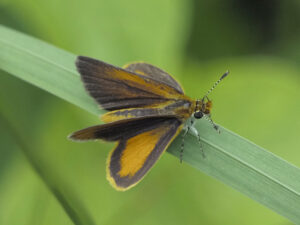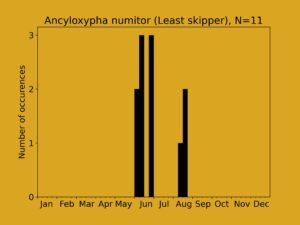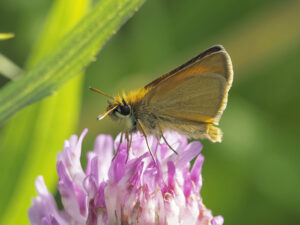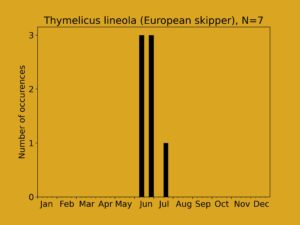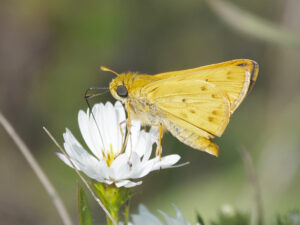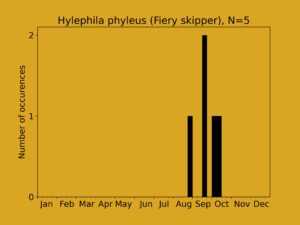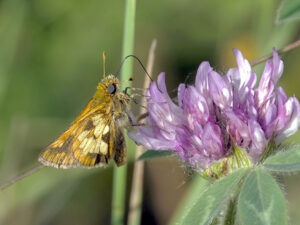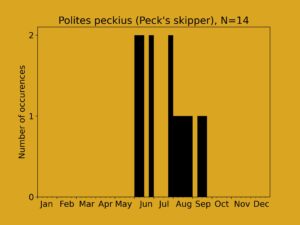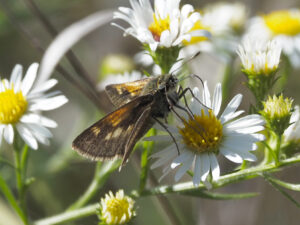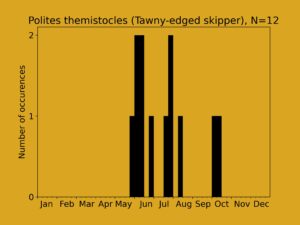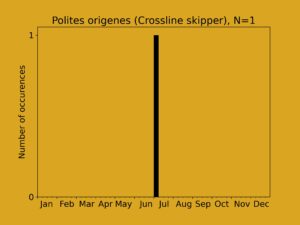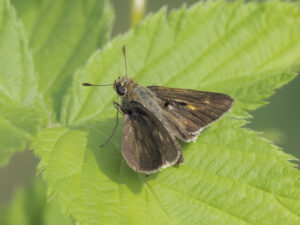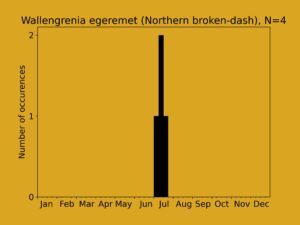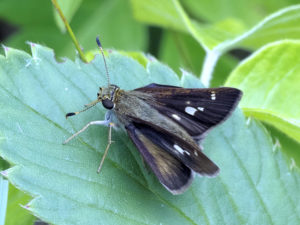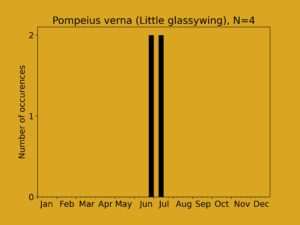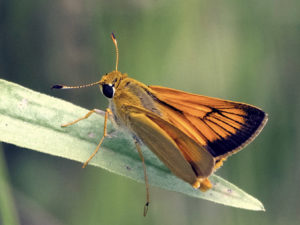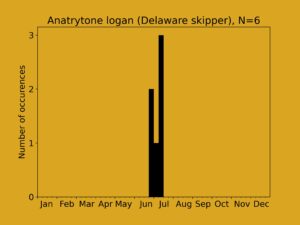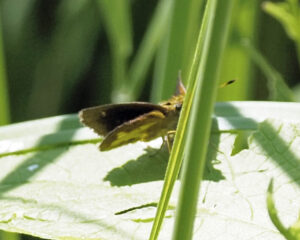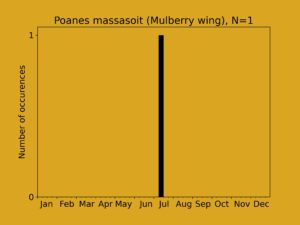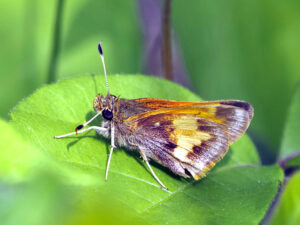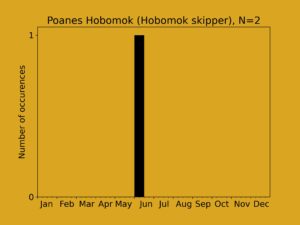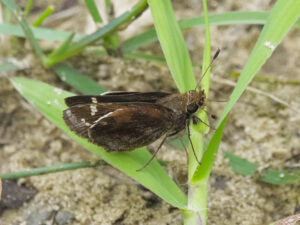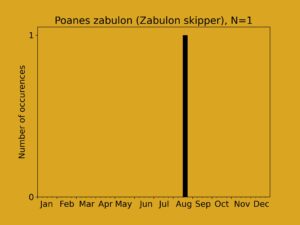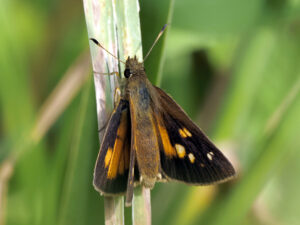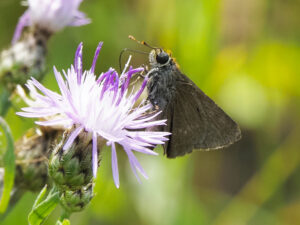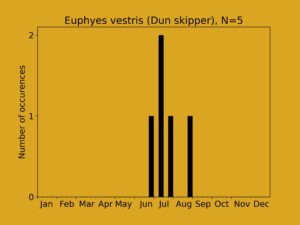The Red Cedar River Plant Preserve
Most people interested in natural history have their “special place” where they like to go to experience the natural world. It is often nearby – maybe just a back yard or local park. Mine is a tiny nature preserve about a mile walk from my house. The Red Cedar River Plant Preserve is a 10-acre plot maintained by the Michigan Nature Association within the city limits of Williamston (LAT/LON: 42.69122579, -84.26713057). It is an oasis among subdivisions of upscale homes with manicured (and undoubtedly chemically-saturated) lawns. And it is a wonderful example of why we must work to preserve the small remnants of nature that remain within our urban areas. Sadly, an adjacent empty field is in the process of being developed, and so the preserve will soon be entirely surrounded by houses.
The preserve habitats and their butterflies
I have now photographed 48 species of butterflies in this small space. A path winds through an old field of about three acres that is perched above the Red Cedar River. Here I have seen many species that nectar on the weeds and wildflowers in the field. Common here are numerous types of skippers (Peck’s, Tawny-Edged, Silver-Spotted, Delaware, Crossline, European, Common Checkered, Northern Broken-Dash, and Little Glassy-Wing.) I’ve also spotted a few less common skippers here, who were perhaps just passing through (Arctic, Fiery, Zabulon, Wild-Indigo Duskywing). The dry field is home to many other butterflies that I see often (Common Ringlet, Common Wood-Nymph, Cabbage White, Great-Spangled Fritillary, Eastern Tailed-blue, American Copper, Orange and Clouded Sulphurs, Northern and Pearl Crescents.) A few wetlands butterflies wander up from the floodplane to nectar in the field (Least Skipper, Acadian Hairstreak, Baltimore Checkerspot) and a couple of vagrants have stopped here in the field (Variegated Fritillary, Common Buckeye). I have seen several species of swallowtail either in the field or in the surrounding brush and small trees, including Black Swallowtail and the only dark form Eastern Tiger Swallowtail I have ever photographed. Giant Swallowtails fly here among the hop trees, although I have yet to spot any “orange dog” caterpillars. The brush and small trees are also home to many woodland-edge butterflies (Hackberry Emperor, Spring Azure, Hobomok Skipper, Little Wood-Satyr). Viceroy and Monarch seem to enjoy nectaring in a large patch of blackberry at the field edge.
There is a line of mature oak and cherry trees along the ridge above the floodplane to the south of the field, and here I often see woodland butterflies such as Eastern Comma, Banded Hairstreak, Red-spotted Purple, and Mourning Cloak.
The floodplane and river’s edge make up the largest part of the preserve. There used to be a small boardwalk through the sedge wetland along the edge of the floodplane, but it has recently been removed, and so much of the preserve is inaccessible. Even so, while walking along the edge of the wetland I have seen Appalachian and Eyed Brown, Northern Pearly-Eye, Dun Skipper, Broad-Winged Skipper, and Mulberry Wing. I’m convinced that there are other wetland butterflies to be discovered here – possibly Black Dash and Bronze Coppers.
About my photographs
The butterfly images below are arranged as given in the book Michigan Butterflies & Skippers, by Mogens C. Nielsen (MSU Extension, 1999), and use his species numbering system. There is one image for each butterfly species I have photographed. There are 162 species and subspecies listed in the book by Mogens Nielsen. There is at least one other species (Ocola skipper) that is not listed, for a total of 163 species and subspecies recorded in Michigan. Many of these are very rare strays that have only been recorded once or a few times (such as the Eufala skipper), or were once regularly recorded but now are most probably extirpated (such as the regal fritillary). It is quite amazing that of the 163 species ever spotted in Michigan, I have seen nearly a third in this small preserve. If you remove the extirpated species, the geographically-restricted species, and the rare strays, I’m sure I have seen half of the remaining species here in these few special acres. What a treasure! Plus, there are several other common species that I have seen nearby (including in my own garden) that I expect to eventually see in the preserve — red admiral, question mark, gray hairstreak, spicebush swallowtail, American lady, and painted lady, among others.
The plots next to each species show the number of times I photographed the species at the Red Cedar River Plant Preserve in a given week of the year, regardless of the year. Note that the number of occurrences is independent of the number of individuals observed. If, for instance, I saw ten monarchs at the preserve on a given day, this is counted as a single occurrence. Note that I only count an occurrence when I have photographed the species and can definitively identify the species from the photos. I have seen many of these species on numerous other occasions without being able to get a good photograph. For instance, I was only able to photograph a Giant Swallowtail once, even though I have seen them many times on the wing (and that single photo is no prize-winner!)
To see maps of all of my observations, including those in the preserve, please visit my butterfly page. You can zoom in to the area of the preserve to see every spot I have taken a photo that led to an identification.
Data are current to June 13, 2025.
Summary of all observations
This plot shows the distribution by week of all observations, regardless of species, representing the result of 38 visits to the preserve.
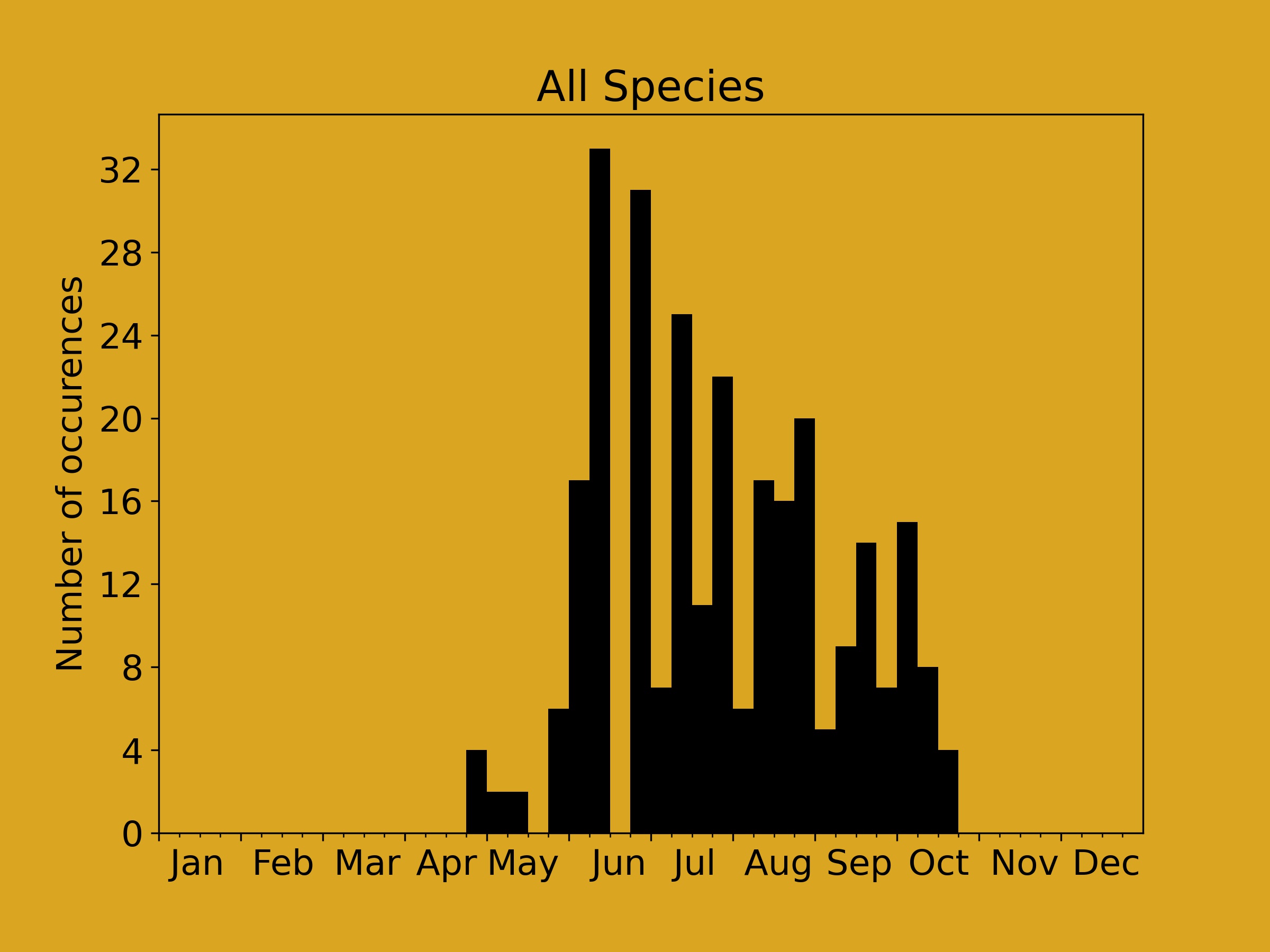
Summary of species observed
This plot shows the distribution by week of the number of species observed.
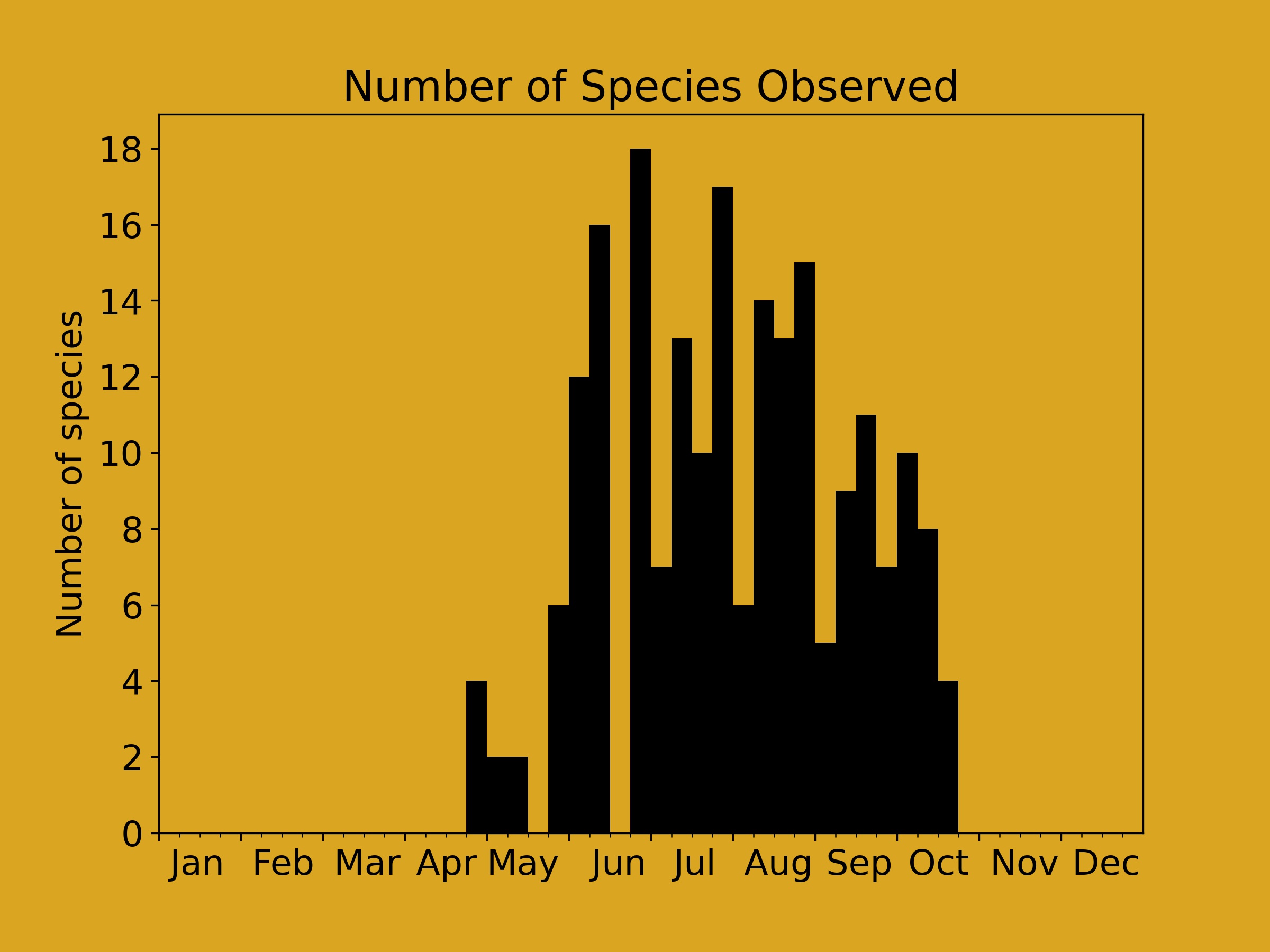
Family Papilionidae: Swallowtails
1 Battus philenor (Pipevine swallowtail)
2 Papilio polyxenes (Black swallowtail)
3 Papilio machaon (Old world swallowtail)
4 Papilio cresphontes (Giant swallowtail)
5 Papilio glaucus (Eastern tiger swallowtail)
6 Papilio canadensis (Canadian tiger swallowtail)
7 Papilio troilus (Spicebush swallowtail)
8 Eurytides marcellus (Zebra swallowtail)
Family Pieridae: Whites, Sulphurs
9 Pontia protodice (Checkered white)
10 Pontia occidentalis (Western white)
11 Pieris oleracea (Mustard white)
12 Pieris virginiensis (West Virginia white)
13 Pieris rapae (Cabbage white)
14 Euchloe ausonides (Large marble)
15 Euchloe olympia (Olympia marble)
16 Colias philodice (Clouded sulphur)
17 Colias eurytheme (Orange sulphur)
18 Colias interior (Pink-edged sulphur)
19 Zerene cesonia (Southern dogface)
20 Phoebis sennae (Cloudless sulphur)
21 Phoebis philea (Orange-barred sulphur)
22 Pyrisitia lisa (Little yellow)
23 Abaeis nicippe (Sleepy orange)
24 Eurema mexicana (Mexican yellow)
25 Nathalis iole (Dainty sulphur)
Family Lycinidae: Harvesters, Coppers, Hairstreaks, Blues
26 Feniseca tarquinius (Harvester)
27 Lycaena phlaeas (American copper)
28 Lycaena hyllus (Bronze copper)
29 Lycaena epixanthe (Bog copper)
30 Lycaena dorcas (Dorcas copper)
31 Lycaena helloides (Purplish copper)
32 Satyrium titus (Coral hairstreak)
33 Satyrium acadica (Acadian hairstreak)
34 Satyrium edwardsii (Edwards’ hairstreak)
35 Satyrium calanus (Banded hairstreak)
36 Satyrium caryaevorus (Hickory hairstreak)
37 Satyrium liparops (Striped hairstreak)
38 Satyrium favonius (Oak hairstreak)
39 Calycopis cecrops (Red-banded hairstreak)
40 Callophrys augustinus (Brown elfin)
41 Callophrys polios (Hoary elfin)
42 Callophrys irus (Frosted elfin)
43 Callophrys henrici (Henry’s elfin)
44 Callophrys niphon (Eastern pine elfin)
45 Callophrys eryphon (Western pine elfin)
46 Parrhasius m-album (White-M hairstreak)
47 Strymon melinus (Gray hairstreak)
48 Erora laeta (Early hairstreak)
49 Echinargus isola (Reakirt’s blue)
50 Cupido comyntas (Eastern tailed-blue)
51 Cupido amyntula (Western tailed-blue)
52 Celastrina ladon (Spring azure)
53 Celastrina neglecta (Summer azure)
54 Celastrina lucia (Northern azure)
55 Glaucopsyche lygdamus (Silvery blue)
56 Plebejus idas (Northern blue)
57 Plebejus melissa samuelis (Karner blue)
58 Plebejus saepiolus (Greenish blue)
Family Riodinidae: Metalmarks
59 Calephelis muticum (Swamp metalmark)
Family Nymphalidae: Brushfoots
60 Libytheana carinenta (American snout)
61 Agraulis vanillae (Gulf fritillary)
62 Euptoieta claudia (Variegated fritillary)
63 Speyeria cybele (Great spangled fritillary)
63a Speyeria cybele krautwurmi (Krautwurm’s fritillary)
64 Speyeria aphrodite (Aphrodite fritillary)
65 Speyeria idalia (Regal fritillary)
66 Speyeria atlantis (Atlantis fritillary)
67 Boloria eunomia (Bog fritillary)
68 Boloria selene (Silver-bordered fritillary)
68a Boloria selene atrocostalis (Bog silver-bordered fritillary)
69 Boloria bellona (Meadow fritillary)
70 Boloria frigga (Frigga fritillary)
71 Boloria freija (Freija fritillary)
72 Chlosyne gorgone (Gorgone checkerspot)
73 Chlosyne nycteis (Silvery checkerspot)
74 Chlosyne harrisii (Harris’ checkerspot)
75 Phyciodes tharos (Pearl crescent)
76 Phyciodes cocyta (Northern crescent)
77 Phyciodes batesii (Tawny crescent)
78 Euphydryas phaeton (Baltimore checkerspot)
79 Polygonia interrogationis (Question mark)
80 Polygonia comma (Eastern comma)
81 Polygonia satyrus (Satyr comma)
82 Polygonia faunus (Green comma)
83 Polygonia gracilis (Hoary comma)
84 Polygonia progne (Gray comma)
85 Nymphalis vaualbum (Compton Tortoiseshell)
86 Nymphalis californica (California Tortoiseshell)
87 Nymphalis antiopa (Mourning cloak)
88 Aglias milberti (Milbert’s tortoiseshell)
89 Vanessa virginiensis (American lady)
90 Vanessa cardui (painted lady)
91 Vanessa atalanta (Red admiral)
92 Junonia coenia (Common buckeye)
93 Limenitis arthemis arthemis (White admiral)
93a Limenitis arthemis astyanax (Red-spotted purple)
94 Limenitis archippus (Viceroy)
95 Anaea andria (Goatweed leafwing)
96 Asterocampa celtis (Hackberry emperor)
97 Asterocampa clyton (Tawny emperor)
98 Enodia anthedon (Northern pearly-eye)
99 Enodia creola (Creole pearly-eye)
100 Satyrodes eurydice (Eyed brown)
101 Satyrodes appalachia (Appalachian brown)
102 Neonympha mitchellii (Mitchell’s satyr)
103 Megisto cymela (Little wood satyr)
104 Coenonympha tullia (Common ringlet)
105 Cercyonis pegala (Common wood-nymph)
106 Erebia discoidalis (Red-disked alpine)
107 Oeneis macounii (Macoun’s arctic)
108 Oeneis chryxus (Chryxus arctic)
109 Oeneis jutta (Jutta arctic)
110 Danaus plexippus (Monarch)
111 Danaus gilippus (Queen)
Family Hesperiidae: Skippers
112 Epargyreus clarus (Silver-spotted skipper)
113 Urbanus proteus (Long-tailed skipper)
114 Achalarus lyciades (Hoary edge)
115 Thorybes bathyllus (Southern cloudywing)
116 Thorybes pylades (Northern cloudywing)
117 Erynnis icelus (Dreamy duskywing)
118 Erynnis brizo (Sleepy duskywing)
119 Erynnis juvenalis (Juvenal’s duskywing)
120 Erynnis horatius (Horace’s duskywing)
121 Erynnis martialis (Mottled duskywing)
122 Erynnis lucilius (Columbine duskywing)
123 Erynnis baptisiae (Wild indigo duskywing)
124 Erynnis persius (Persius duskywing)
125 Pyrgus centaureae (Grizzled skipper)
126 Pyrgus communis (Common checkered skipper)
127 Pholisora catullus (Common sootywing)
128 Carterocephalus palaemon (Arctic skipper)
129 Nastra lherminier (Swarthy skipper)
130 Ancyloxypha numitor (Least skipper)
131 Oarisma powesheik (Powesheik skipperling)
132 Thymelicus lineola (European skipper)
133 Hylephila phyleus (Fiery skipper)
134 Hesperia comma (Common Branded Skipper)
135 Hesperia ottoe (Ottoe Skipper)
136 Hesperia leonardus (Leonard’s Skipper)
137 Hesperia metea (Cobweb Skipper)
138 Hesperia sassacus (Indian Skipper)
139 Polites peckius (Peck’s skipper)
140 Polites themistocles (Tawny-edged skipper)
141 Polites origenes (Crossline skipper)
142 Polites mystic (Long dash)
143 Wallengrenia egeremet (Northern broken-dash)
144 Pompeius verna (Little glassywing)
145 Atalopedes campestris (Sachem)
146 Anatrytone logan (Delaware skipper)
147 Poanes massasoit (Mulberry wing)
148 Poanes hobomok (Hobomok skipper)
149 Poanes zabulon (Zabulon skipper)
150 Poanes viator (Broad-winged skipper)
151 Euphyes dion (Dion skipper)
152 Euphyes dukesi (Dukes’ skipper)
153 Euphyes conspicua (Black dash)
154 Euphyes bimacula (Two-spotted skipper)
155 Euphyes vestris (Dun skipper)
156 Atrytonopsis hianna (Dusted skipper)
157 Amblyscirtes hegon (Pepper and salt skipper)
158 Amblyscirtes vialis (Common roadside-skipper)
159 Lerodea eufala (Eufala skipper)
The following butterfly is not listed in Michigan Butterflies & Skippers
XXX Panoquina ocola (Ocola skipper)

